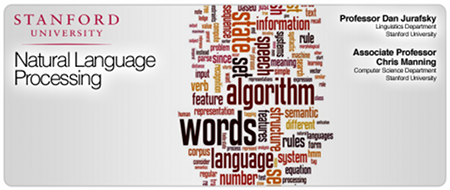Unlike the 12 week NLP course last year which estimated 10 hours a week and turned out to be more like 15-20 hours a week, this course was much more realistic in estimation at 10 weeks of 8 hours. I think I more or less hit the mark on that point spending about 1 day every week for the past 10 weeks studying machine learning - so around half the time required for the NLP course.
The course was written and presented by Andrew Ng who seems to be rather prolific and somewhat of an academic star in his fields of machine learning and artificial intelligence. He is one of the co-founders of the coursera site which along with their main rival, Udacity, have brought about the popular rise of Massive Open Online Learning.
The Machine Learning Course followed the same format as the NLP course from last year which I can only assume is the standard coursera format, at least for technical courses anyway. Each week there were 1 or two main topic areas to study which were presented in a series of videos featuring Andrew talking through a set of slides on which he's able to hand write notes for demonstration purposes, just as if you're sitting in a real lecture hall at university. To check your understanding of the content of the videos there are questions which must be answered on each topic against which you're graded. The second main component each week is a programming exercise which for the Machine Learning Course must be completed in Octave - so yet another programming language to add to your list. Achieving a mark of 80% or above across all the questions and programming exercises results in a course pass. I appear to have done that with relative ease for this course.
The 18 topics covered were:
- Introduction
- Linear Regression with One Variable
- Linear Algebra Review
- Linear Regression with Multiple Variables
- Octave Tutorial
- Logistic Regression
- Regularisation
- Neural Networks Representation
- Neural Networks Learning
- Advice for Applying Machine Learning
- Machine Learning System Design
- Support Vector Machines
- Clustering
- Dimensionality Reduction
- Anomaly Detection
- Recommender Systems
- Large Scale Machine Learning
- Application Example Photo OCR
The major thought behind the course seems to be to teach as many different algorithms as possible. There really is a great range. Starting of simply with linear algorithms and progressing right up to the current state-of-the-art Neural Networks and the ever fashionable map-reduce stuff.
I didn't find the course terribly difficult, I'm no expert in any of the topics but have studied enough maths not to struggle with that side of things and don't struggle with programming either. I didn't need to use the forums or any of the other social elements offered during the course so I don't really have a feel for how others found the course. I can certainly imagine someone finding it a real struggle if they don't have a particularly deep background in either maths or programming.
There was, as far as I can think right now, one (or maybe two depending on how you count) omission from the course. Most of the programming exercises were heavily frameworked for you in advance, you just have to fill in the gaps. This is great for learning the various different algorithms presented during the course but does leave a couple of areas at the end of the course you're not so confident with (aside from not really having a wide grasp of the Octave programming language). The omission of which I speak is that of storing and bootstrapping the models you've trained with the algorithm. All the exercises concentrated on training a model, storing it in memory, using it and as the program terminates then so your model disappears. It would have been great to have another module on the best ways to persist models between program runs, and how to continue training (bootstrap) a model that you have already persisted. I'll feed that thought back to Andrew when the opportunity arises over the next couple of weeks.
The problem going forward wont so much be applying what has been offered here but working out what to apply it to. The range of problems that can be tackled with these techniques is mind-blowing, just look at the rise of analytics we're seeing in all areas of business and technology.
Overall then, a really nice introduction into the world of machine learning. Recommended!










